Large Choral Works
Missa San Giuseppe for TTBB chorus and piano or organ.
Dedicated to the Schola Cantorum of St. Joseph's Seminary, Yonkers, NY and Dr. Jennifer Donelson, Director.
Listen and watch: Kyrie and Agnus Dei sung by the Lviv Chamber Choir and Orchestra, Lviv, Ukraine.
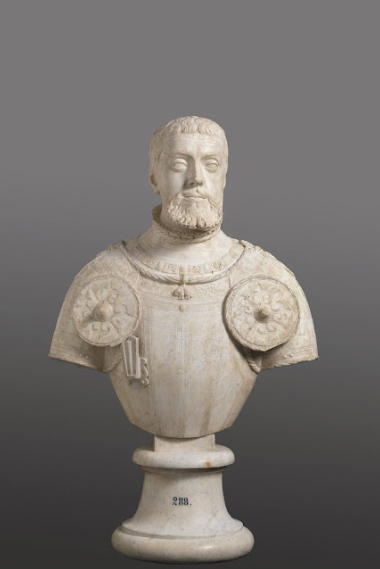
Take Joy SATB or TTBB chorus and keyboard or chamber orchestra. Text by Fra Giovanni (c.1433-1515). A Letter to the Most Illustrious the Contessina Allagia degli Aldobrandeschi, Written Christmas Eve Anno Domini 1513.
Commission and Premiere: Federal City Performing Arts Chorus 1987.
Revised version: Penn State Glee Club and Women's Chorus, December 6, 1992.
Contact composer for score.
but there is much that, while I cannot give, you can take.
No heaven can come to us unless our hearts find rest in it today.
Take Heaven.
No peace lies in the future which is not hidden in the present moment.
Take Peace.
The gloom of the world is but a shadow; behind it, yet within our reach is joy.
Take Joy!
And so, at this Christmas time, I greet you, with the prayer that for you,
now and forever, the day breaks and the shadows flee away.

These Things Shall Be SATB or TTBB chorus , solo voice and keyboard or optional brass quintet and organ. Text by John Addington Symonds (1840-1893).
Commission and Premiere: Federal City Performing Arts Chorus 1986.
Contact composer for score.
Than e’er the world hath known shall rise
With flame of freedom in their souls,
And light of knowledge in their eyes.
They shall be gentle, brave, and strong,
To spill no drop of blood, but dare
All that may plant man’s lordship firm
On earth, and fire, and sea, and air.
Nation with nation, land with land,
Inarmed shall live as comrades free;
In every heart and brain shall throb
The pulse of one fraternity.
New arts shall bloom of loftier mould,
And mightier music thrill the skies,
And every life shall be a song,
When all the earth is paradise.
Choral Arrangements
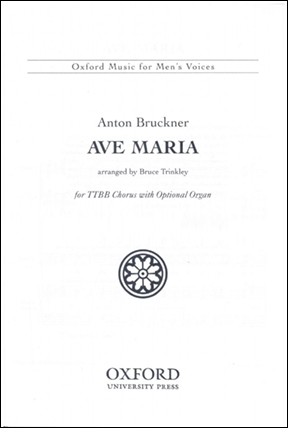
Ave Maria (Bruckner) Arranged for TTBB Chorus unaccompanied or with optional organ. Boosey and Hawkes
Publisher Description: Originally scored for solo voice and organ by Anton Bruckner (1824-1896), here the melody is distributed among all four voices, with supporting harmonies transcribed from the organ accompaniment. Very accessible for men’s voices, with none of the challenges usually encountered in Bruckner’s choral works. Sonorous and majestic, like the finest of Bruckner’s choral works.
View score sample. Listen to midi.
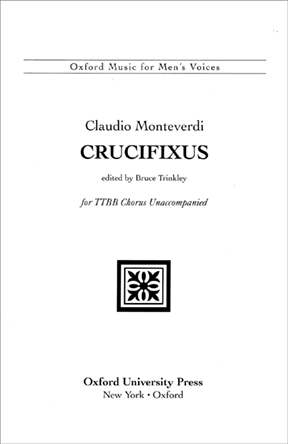
Crucifixus was composed as part of the Credo for a mass of thanksgiving celebrated on November 28, 1631 in the Basilica of St. Mark in Venice to commemorate the city's recovery from the ravages of the plague. The dark tone of the TTBB voicing and the text makes it appropriate for any time of the liturgical year but especially during Lent and Holy Week. An excellent way to feature the tenors and basses in the choir, it may be sung effectively by solo voices, chamber choir, or full chorus. The origin of the piece also makes it an appropriate way to commemorate those lost to COVID.
View score sample.
Passus, et sepultus est.
He was crucified also for us under Pontius Pilate;
He suffered and was buried.
Glory be to God on high Canon for 3 voices by Dr. William Boyce (1711-1779)
From A Collection of Catches, Canons and Glees, known as the Warren Collection, containing the best compositions sung by the London Catch Club from 1762 to 1793. Although originally intended to be sung by men’s voices in a secular setting, the canon is also appropriate for use in church, sung by the TB choir or the congregation.
View score. Listen to the Penn State Glee Club sing Glory be to God on high P.S. – Happy Holidays
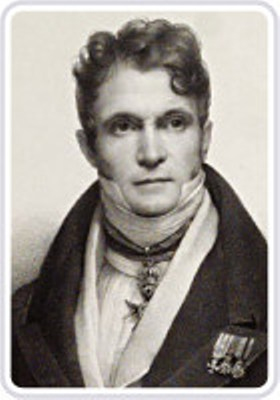
God Who Made Every Living Creature (Créateur de ce nouveau monde) Edited for TTB a cappella.
Sacred chorus in French and English from the French grand opera Fernand Cortez (1809) by Gaspare Spontini (1774-1851). The opera was written to celebrate Napoleon’s conquests in Spain and was greatly admired by Berlioz. This sacred chorus from the opera is suitable for concert use or for church services to provide a short, effective, and easy piece for the men in the choir. It is a lovely lyrical prayer for peace and forgiveness and is equally effective in French or in the arranger’s English version. Appropriate for any time in the liturgical year.
Download score.
God who made every living creature
Now teach us how to live in love.
Lord, be our hope and comfort ever.
O God in heaven above, hear us.
How Can I Keep from Singing? Arranged for TTBB unaccompanied. Alfred Publishing LG70748
Dedicated to the memory of Dr. Martin Luther King. Exciting and challenging concert version of the hymn by American Baptist minister Robert Lowry (1826-1899). Suitable for concert use, church services or ceremonies honoring Dr. King and his legacy.
View score. Listen to midi.
Above earth´s lamentations,
I hear the real, though far-off hymn
That hails a new creation.
Through all the tumult and the strife
I hear its music ringing,
It sounds an echo in my soul.
How can I keep from singing?
While though the tempest round me roars,
I hear the truth, it liveth.
What though the darkness 'round me falls,
Songs in the night it giveth.
No storm can shake my inmost calm,
While to that rock I´m clinging.
Since love is Lord of heaven and earth
How can I keep from singing?
When tyrants tremble sick with fear
And hear their death knells ringing,
When friends rejoice both far and near
How can I keep from singing?
In prison cells and dungeons vile
Our thoughts to them are winging,
When friends by shame are undefiled
How can I keep from singing?
How Great Thou Art Swedish hymn arranged for TTBB and piano.
Original Swedish text by Carl Gustav Boberg (1859–1940). English text by Stuart K. Hine (1899-1989)
The beloved hymn in a gala arrangement appropriate for church or concert.
Commission and Premiere: The Huntington Men’s Chorus 2009.
View score. Listen to midi. Listen to The Priests.
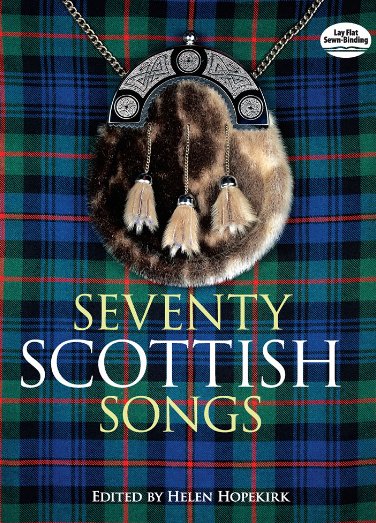
Hush-a-bye, Darling Scottish lullaby arranged for TB/TTB/TTBB and piano. Hinshaw HMC1646
Ancient Lochaber lullaby from Songs Of The Gael by Walsh Patrick, and the verses by Lachlan MacBean (1853-1931). The accompaniment is drawn from
Seventy Scottish Songs, the only anthology of the great Scottish song composer and pianist, Helen Hopekirk (1856-1945). Bruce has made an exquisite and lyrical arrangement especially appropriate for young men. It was written for the Penn State Glee Club during a composer residency at the Hambidge Center in Georgia in 1996. The text makes the arrangement appropriate for the church during the Christmas season.
View score sample. Listen to midi.
Hushaby, darling, and hushaby, dear O,
Hushaby, darling will yet be a hero,
Lullaby, little one, bonnie wee baby,
He'll be a hero, and fight for us maybe;
Placidly, peacefully, slumber has bound him,
Angels are lovingly watching around him;
Beautiful spirits, his sorrow beguiling,
Sweetly they whisper, and baby is smiling.
Miserere nobis Canon for three voices by William Hayes (1706-1777)
From A Collection of Catches, Canons and Glees, known as the Warren Collection, containing the best compositions sung by the London Catch Club from 1762 to 1793. Although originally intended to be sung by men’s voices in a secular setting, the canon is also appropriate for use in church, sung by the tenors and basses in the choir or the congregation.
View score. Listen to midi.
Have mercy on us, saviour of the world.
O You Lovely Jesus Child (O du Liebes Jesu Kind) by Anton Bruckner (1824-1896) Arranged for TTBB and optional keyboard. English version by Jason Charnesky.
Performance Note: The piece may be sung twice, the first time in English, the second in German, or vice versa.
A beautiful lullaby for any season, but especially Christmas.
View score. Listen to midi.
O God, Our Help in Ages Past Hymn by Isaac Watts (1674-1748) for SATB or TTBB chorus and organ or piano.
Written for the Memorial Service of John W. Oswald (1938-1994), Eisenhower Chapel.
Oswald served as President of Penn State from 1970 to 1982. He was a Navy veteran and his widow Rose requested that the Penn State Glee Club sing the Navy Hymn at his Memorial Service. The lead motive of the tune is treated as a point of imitation throughout the celebratory anthem. Grand, modal and chromatic.
View the score. Listen to midi.
Prayer of Thanksgiving (We Gather Together) Old Dutch melody. For SATB chorus and keyboard.
This grand old hymn tune has long been a staple of Thanksgiving celebrations.
Arranged for and dedicated to the St. Andrews Choir of State College, PA; Walter Wells, Conductor; Gwen Catchen, Organist.
View the score. Listen to midi.
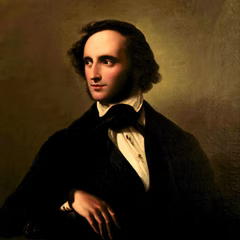
by Wilhelm Hensel, 1847
Say Where Is He Born by Felix Mendelssohn (1809-1847) from Christus (Matthew 2: 1-2) Arranged for 3 solo voices or TBB chorus and piano.
Ideal for Advent and Christmas and a great way to feature the tenors and basses in the choir or your three soloists. Perform as a lead-in to Trinkley’s arrangement of Mendelssohn’s There Shall a Star.
View score. Listen to midi.
There Shall a Star Arranged for TTBB, solo, and piano or organ. (4:00) Yelton Rhodes YR4903 Available from J. W. Pepper.
Chorus from the unfinished oratorio Christus, Op. 97 by Felix Mendelssohn (1809-1847). Words from Matthew 2: 1-2. A major piece for the men in the choir during Advent and Christmas seasons.
View score. Listen to midi.